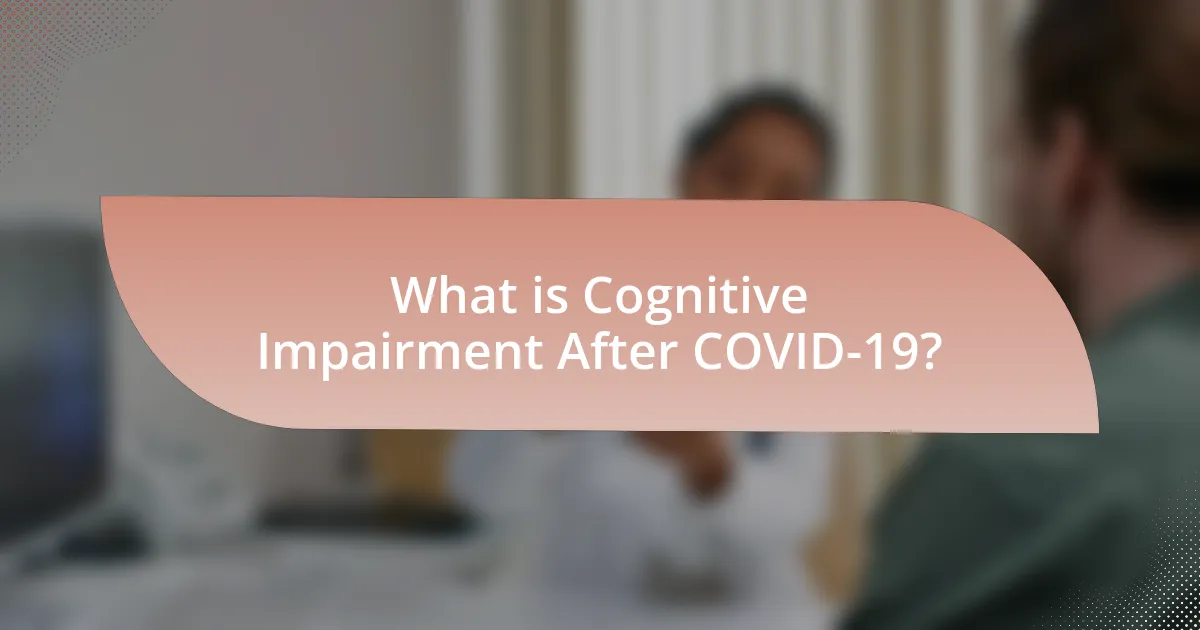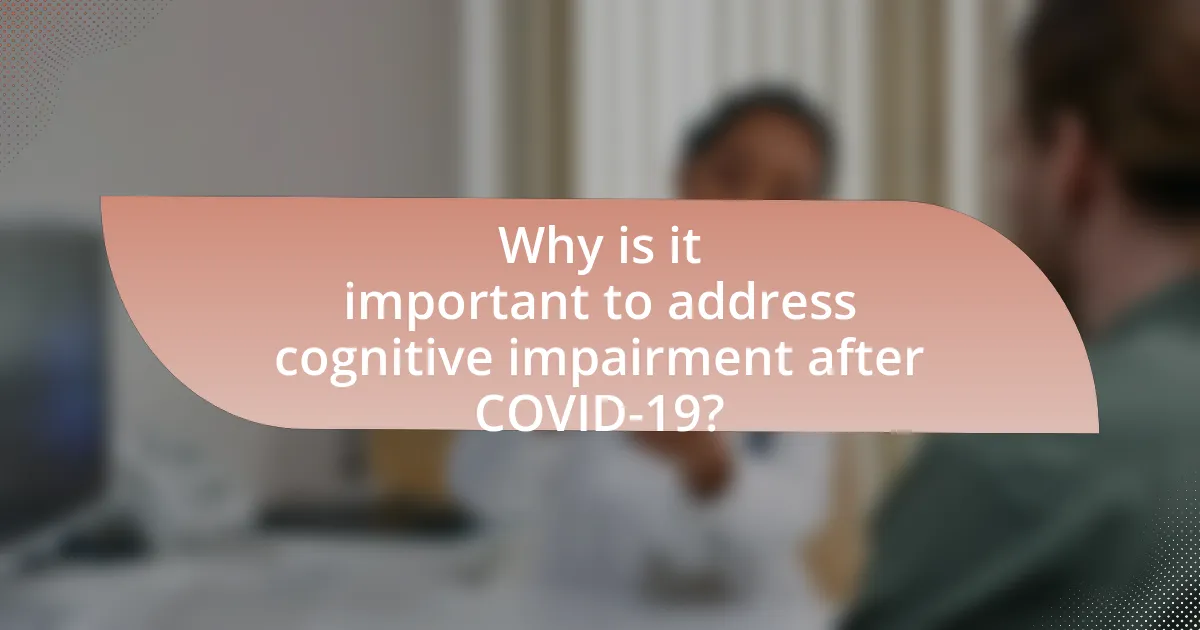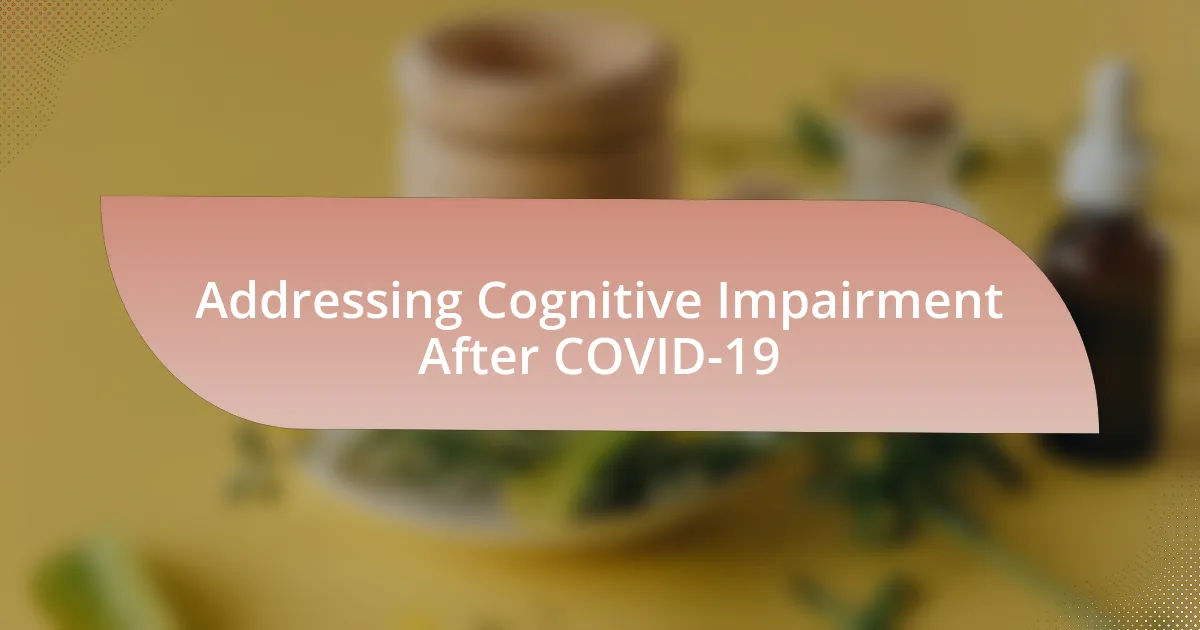Cognitive impairment after COVID-19 encompasses a variety of cognitive difficulties, including memory, attention, and executive function issues, affecting 10-30% of survivors. The article explores the mechanisms through which COVID-19 leads to these impairments, such as inflammation and hypoxia, and highlights the neurological effects experienced by patients. It discusses the symptoms, long-term consequences of untreated cognitive issues, and the importance of addressing these impairments for improving quality of life. Additionally, the article outlines effective strategies for rehabilitation, including cognitive training, lifestyle changes, and available resources to support recovery.

What is Cognitive Impairment After COVID-19?
Cognitive impairment after COVID-19 refers to a range of difficulties in cognitive functions such as memory, attention, and executive function experienced by some individuals following infection with the virus. Studies indicate that approximately 10-30% of COVID-19 survivors report persistent cognitive issues, often referred to as “brain fog,” which can include problems with concentration, memory lapses, and difficulty in processing information. Research published in the journal “Nature” by Taquet et al. (2021) found that cognitive deficits were prevalent among COVID-19 patients, highlighting the need for further investigation into the long-term neurological effects of the virus.
How does COVID-19 lead to cognitive impairment?
COVID-19 can lead to cognitive impairment through mechanisms such as inflammation, hypoxia, and direct viral invasion of the central nervous system. Research indicates that the virus triggers an inflammatory response, which can damage brain cells and disrupt neural pathways. A study published in the journal “Nature” by Taquet et al. (2021) found that COVID-19 survivors exhibited a higher incidence of cognitive deficits, including memory and attention issues, compared to non-infected individuals. Additionally, hypoxia, resulting from respiratory complications, can impair brain function by reducing oxygen supply, further contributing to cognitive decline.
What are the neurological effects of COVID-19?
COVID-19 can lead to various neurological effects, including cognitive impairment, headaches, dizziness, and loss of taste or smell. Research indicates that approximately 30% of COVID-19 patients experience neurological symptoms, which can persist long after the acute phase of the illness. A study published in the journal “Nature” by Helms et al. (2020) found that neurological complications such as encephalopathy and stroke occurred in a significant number of hospitalized patients. Additionally, a systematic review in “The Lancet Psychiatry” highlighted that cognitive deficits, often referred to as “brain fog,” are reported by many survivors, affecting memory, attention, and executive function. These findings underscore the importance of monitoring and addressing neurological health in individuals recovering from COVID-19.
How do pre-existing conditions influence cognitive impairment post-COVID?
Pre-existing conditions significantly influence cognitive impairment post-COVID by exacerbating neurological deficits and increasing the risk of long-term cognitive decline. Individuals with conditions such as diabetes, hypertension, and cardiovascular diseases often experience heightened inflammation and reduced blood flow to the brain, which can lead to cognitive issues. Research indicates that patients with pre-existing cognitive impairments or neurodegenerative diseases are more likely to experience worsened cognitive function after COVID-19 infection, as evidenced by a study published in the journal “Nature” by Taquet et al. (2021), which found that individuals with prior neurological conditions had a higher incidence of cognitive deficits following COVID-19.
What are the symptoms of cognitive impairment after COVID-19?
Cognitive impairment after COVID-19 can manifest as difficulties with attention, memory, and executive function. Research indicates that individuals may experience problems such as forgetfulness, difficulty concentrating, and challenges in decision-making. A study published in the journal “Nature” found that approximately 30% of COVID-19 survivors reported cognitive difficulties months after infection, highlighting the prevalence of these symptoms.
How can cognitive impairment manifest in daily life?
Cognitive impairment can manifest in daily life through difficulties in memory, attention, and problem-solving. Individuals may struggle to remember recent conversations or appointments, leading to missed commitments. Attention deficits can result in challenges focusing on tasks, making it hard to complete work or follow conversations. Additionally, impaired problem-solving abilities may hinder decision-making, causing frustration in everyday situations such as managing finances or planning activities. Research indicates that these cognitive challenges can significantly impact quality of life, as evidenced by studies showing that up to 30% of COVID-19 survivors report cognitive difficulties, highlighting the prevalence of this issue in the context of post-viral cognitive impairment.
What cognitive functions are most affected by COVID-19?
COVID-19 most significantly affects cognitive functions such as attention, memory, and executive function. Research indicates that individuals recovering from COVID-19 often report difficulties in concentrating, recalling information, and managing tasks that require planning and decision-making. A study published in the journal “Nature” by Taquet et al. (2021) found that cognitive deficits were prevalent in a significant portion of COVID-19 survivors, highlighting the impact on these specific cognitive domains.

Why is it important to address cognitive impairment after COVID-19?
Addressing cognitive impairment after COVID-19 is crucial because it significantly affects individuals’ daily functioning and quality of life. Research indicates that a substantial percentage of COVID-19 survivors experience cognitive deficits, including memory loss and attention difficulties, which can persist long after the acute phase of the illness. A study published in the journal “Nature” found that approximately 30% of COVID-19 patients reported cognitive issues, highlighting the need for targeted interventions. By addressing these impairments, healthcare providers can improve recovery outcomes, enhance mental health, and support reintegration into work and social environments.
What are the long-term consequences of untreated cognitive impairment?
Untreated cognitive impairment can lead to significant long-term consequences, including increased risk of dementia, decreased quality of life, and impaired daily functioning. Research indicates that individuals with untreated cognitive issues may experience accelerated cognitive decline, with studies showing that mild cognitive impairment can progress to dementia in approximately 10-15% of cases annually. Additionally, untreated cognitive impairment can result in social isolation, as individuals may withdraw from activities and relationships due to difficulties in communication and memory. This isolation can further exacerbate mental health issues, such as depression and anxiety, creating a cycle of decline. Furthermore, untreated cognitive impairment can lead to increased healthcare costs, as individuals may require more extensive medical care and support services over time.
How does cognitive impairment affect quality of life?
Cognitive impairment significantly reduces quality of life by affecting daily functioning, social interactions, and emotional well-being. Individuals with cognitive impairment often struggle with memory, attention, and decision-making, leading to difficulties in performing everyday tasks such as managing finances or maintaining personal hygiene. Research indicates that cognitive impairment is associated with increased levels of anxiety and depression, further diminishing overall life satisfaction. A study published in the Journal of Alzheimer’s Disease found that individuals with cognitive decline reported lower quality of life scores compared to cognitively healthy individuals, highlighting the profound impact of cognitive health on life quality.
What is the impact on mental health and social interactions?
The impact on mental health and social interactions is significant, as cognitive impairment following COVID-19 can lead to increased anxiety, depression, and social withdrawal. Research indicates that individuals recovering from COVID-19 often experience cognitive deficits, which can hinder their ability to engage in social activities and maintain relationships. A study published in the journal “The Lancet Psychiatry” found that 34% of COVID-19 survivors reported symptoms of anxiety or depression, highlighting the mental health challenges associated with the virus. Furthermore, social interactions may decline due to cognitive difficulties, leading to isolation and exacerbating mental health issues.
How can early intervention improve outcomes for those affected?
Early intervention can significantly improve outcomes for individuals affected by cognitive impairment after COVID-19 by facilitating timely access to therapies and support services. Research indicates that early identification and treatment of cognitive deficits can enhance recovery rates and reduce the severity of long-term impairments. For instance, a study published in the Journal of Neuropsychology found that patients who received cognitive rehabilitation within three months of symptom onset showed a 30% greater improvement in cognitive function compared to those who started later. This evidence underscores the importance of prompt intervention in mitigating the effects of cognitive impairment and promoting better overall health outcomes.
What role does rehabilitation play in recovery?
Rehabilitation plays a crucial role in recovery by facilitating the restoration of cognitive functions impaired by conditions such as COVID-19. It employs targeted therapies and interventions designed to improve memory, attention, and executive functions, which are often affected post-infection. Research indicates that structured rehabilitation programs can enhance cognitive performance and overall quality of life for individuals recovering from COVID-19-related cognitive impairment. For instance, a study published in the journal “Neuropsychological Rehabilitation” found that cognitive rehabilitation significantly improved cognitive outcomes in patients with post-viral cognitive deficits.
How can support systems aid in addressing cognitive impairment?
Support systems can aid in addressing cognitive impairment by providing essential resources, emotional support, and structured environments that enhance cognitive functioning. These systems, which include family, friends, healthcare professionals, and community organizations, facilitate access to cognitive rehabilitation programs and therapies that have been shown to improve cognitive abilities. For instance, studies indicate that social engagement and structured cognitive activities can lead to significant improvements in memory and attention in individuals experiencing cognitive decline. Furthermore, support systems can help individuals navigate healthcare services, ensuring they receive timely interventions and personalized care plans tailored to their specific cognitive needs.

What strategies can be employed to address cognitive impairment after COVID-19?
Cognitive rehabilitation strategies can be employed to address cognitive impairment after COVID-19. These strategies include cognitive training exercises, which focus on improving memory, attention, and problem-solving skills. Research indicates that structured cognitive rehabilitation programs can lead to significant improvements in cognitive function among individuals recovering from COVID-19-related cognitive issues. For instance, a study published in the journal “Neuropsychological Rehabilitation” found that participants who engaged in cognitive training showed enhanced cognitive performance compared to those who did not participate in such programs. Additionally, lifestyle modifications, such as regular physical exercise, a balanced diet, and adequate sleep, have been shown to support cognitive health and recovery.
What therapeutic approaches are effective for cognitive rehabilitation?
Cognitive rehabilitation is effectively addressed through approaches such as cognitive training, compensatory strategies, and psychosocial interventions. Cognitive training involves structured exercises aimed at improving specific cognitive functions, which has been shown to enhance memory and attention in individuals recovering from cognitive impairments. Compensatory strategies, including the use of external aids like planners and reminders, help individuals manage daily tasks despite cognitive challenges. Psychosocial interventions, such as group therapy and support networks, provide emotional support and promote social engagement, which are crucial for cognitive recovery. Research indicates that these approaches can significantly improve cognitive outcomes in patients post-COVID-19, as evidenced by studies demonstrating enhanced cognitive performance and quality of life following targeted rehabilitation programs.
How do cognitive training programs work?
Cognitive training programs work by engaging individuals in structured activities designed to improve specific cognitive functions such as memory, attention, and problem-solving skills. These programs utilize exercises that challenge the brain, often through games or tasks that require mental effort, thereby promoting neuroplasticity, which is the brain’s ability to reorganize itself by forming new neural connections. Research indicates that consistent participation in cognitive training can lead to measurable improvements in cognitive performance, as evidenced by studies showing enhanced memory and processing speed in participants who completed such programs.
What role does medication play in managing cognitive symptoms?
Medication plays a crucial role in managing cognitive symptoms associated with cognitive impairment after COVID-19. Specifically, certain medications, such as cholinesterase inhibitors and NMDA receptor antagonists, have been utilized to enhance cognitive function and alleviate symptoms like memory loss and attention deficits. Research indicates that these medications can improve neurotransmitter activity, which is often disrupted in individuals experiencing cognitive decline post-infection. For instance, a study published in the Journal of Neuropsychiatry and Clinical Neurosciences found that patients treated with cholinesterase inhibitors showed significant improvements in cognitive assessments compared to those who did not receive medication. This evidence underscores the importance of pharmacological interventions in addressing cognitive symptoms following COVID-19.
How can lifestyle changes support cognitive recovery?
Lifestyle changes can significantly support cognitive recovery by enhancing brain health and improving overall well-being. Engaging in regular physical exercise has been shown to increase blood flow to the brain, promote neurogenesis, and improve cognitive function, as evidenced by a study published in the Journal of Clinical Psychiatry, which found that aerobic exercise can lead to improvements in memory and executive function. Additionally, adopting a balanced diet rich in antioxidants, omega-3 fatty acids, and vitamins can protect against cognitive decline; research from the American Journal of Clinical Nutrition indicates that diets such as the Mediterranean diet are associated with better cognitive performance. Furthermore, prioritizing sleep hygiene and stress management techniques, such as mindfulness and meditation, can enhance cognitive recovery by reducing inflammation and improving mental clarity, supported by findings from the journal Sleep Medicine Reviews, which highlight the critical role of sleep in cognitive processes.
What dietary adjustments can enhance cognitive function?
Dietary adjustments that can enhance cognitive function include increasing the intake of omega-3 fatty acids, antioxidants, and vitamins such as B vitamins and vitamin D. Omega-3 fatty acids, found in fatty fish like salmon and walnuts, are crucial for brain health and have been linked to improved cognitive performance and reduced risk of cognitive decline. Antioxidants, present in fruits and vegetables like berries and leafy greens, help combat oxidative stress, which can negatively affect brain function. Additionally, B vitamins, particularly B6, B12, and folate, play a significant role in brain health by supporting neurotransmitter function and reducing homocysteine levels, which are associated with cognitive impairment. Vitamin D, obtained from sunlight and fortified foods, is also essential for cognitive health, with studies indicating that deficiency may be linked to cognitive decline.
How does physical activity contribute to cognitive health?
Physical activity enhances cognitive health by improving blood flow to the brain, which supports neurogenesis and synaptic plasticity. Engaging in regular exercise has been shown to increase the production of brain-derived neurotrophic factor (BDNF), a protein that plays a crucial role in learning and memory. Research indicates that individuals who participate in consistent physical activity exhibit better cognitive function and a lower risk of cognitive decline. For instance, a study published in the Journal of Clinical Psychiatry found that aerobic exercise significantly improved cognitive performance in older adults, highlighting the direct link between physical activity and enhanced cognitive abilities.
What resources are available for individuals experiencing cognitive impairment?
Individuals experiencing cognitive impairment can access various resources, including cognitive rehabilitation programs, support groups, and online platforms offering educational materials. Cognitive rehabilitation programs, often provided by healthcare professionals, focus on improving cognitive functions through tailored exercises and strategies. Support groups, such as those organized by the Alzheimer’s Association, offer emotional support and shared experiences among individuals facing similar challenges. Additionally, online resources like the National Institute on Aging provide valuable information on coping strategies and cognitive health. These resources are essential for enhancing the quality of life and managing the effects of cognitive impairment.
How can individuals access cognitive health services post-COVID?
Individuals can access cognitive health services post-COVID through telehealth platforms, community health centers, and specialized cognitive rehabilitation programs. Telehealth has expanded significantly since the pandemic, allowing patients to connect with mental health professionals remotely, which increases accessibility. Community health centers often provide cognitive assessments and therapy services, and many have adapted to offer virtual options. Specialized cognitive rehabilitation programs, which focus on improving cognitive function, are also available through hospitals and rehabilitation facilities, often with referral options from primary care providers.
What community support options exist for cognitive rehabilitation?
Community support options for cognitive rehabilitation include support groups, cognitive training programs, and access to mental health professionals. Support groups provide a platform for individuals to share experiences and coping strategies, fostering a sense of community and reducing feelings of isolation. Cognitive training programs, often offered by local organizations or online platforms, focus on exercises designed to improve memory, attention, and problem-solving skills. Access to mental health professionals, such as psychologists or occupational therapists, is crucial for personalized rehabilitation plans and ongoing support. Research indicates that structured community support can significantly enhance cognitive recovery outcomes, as evidenced by studies showing improved cognitive function in participants engaged in these programs.
What practical tips can help manage cognitive impairment after COVID-19?
To manage cognitive impairment after COVID-19, individuals should engage in regular cognitive exercises, maintain a healthy diet, and establish a consistent sleep routine. Cognitive exercises, such as puzzles and memory games, stimulate brain function and improve cognitive skills. A balanced diet rich in antioxidants, omega-3 fatty acids, and vitamins supports brain health, as evidenced by studies linking nutrition to cognitive performance. Additionally, prioritizing sleep enhances memory consolidation and cognitive function, with research indicating that sleep deprivation negatively impacts cognitive abilities.


